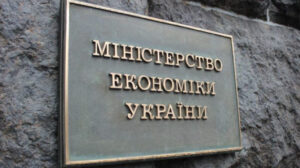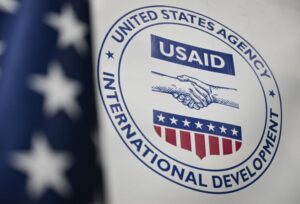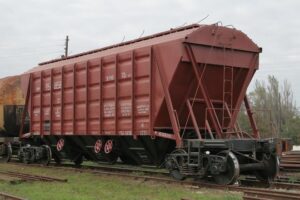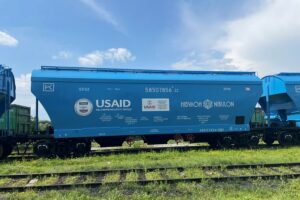
The Ministry of Economy together with USAID launch a grant program for medium and large enterprises for $15 million, under which one business will be able to receive a grant from $250 thousand to $2 million.
“Businesses with an estimated minimum annual sales volume of $8 million in hryvnia equivalent are invited to participate in the program. This indicator is important due to the fact that the target increase in sales by the results of the concept should be at least $2 million,” – said in the release of the Ministry of Economy.
It is indicated that the grant funding should be directed by the program participants to business development, in particular, to increase sales, increase exports and create new jobs.
The condition for participation in the program is the investment of additional funds – own funds of the enterprise or other resources attracted by the enterprise. The selection of the program participants will take place in two stages: the first stage – evaluation of concepts, the second stage – evaluation of detailed grant applications from the participants who passed the first stage. One of the criteria for evaluating concepts will be the number of jobs created.
It is specified that concepts should be submitted no later than February 29, 2024. It is expected that they will be implemented within 12-24 months.

The United States Agency for International Development (USAID) has tripled its grant support under the Competitive Economy of Ukraine program to $11 million, the Ministry of Economy reported on its website on Thursday.
It is noted that the decision was made taking into account the large number of applications and significant interest from processing enterprises.
The increase in funding will also increase the number of grants by about three times, to about 75.
It is specified that the grants will support businesses in the production of innovative products, modernization of production, reduction of manual labor, import substitution and export growth to fill niches previously occupied by Russian and Belarusian products, and localization of production of goods necessary for recovery.
USAID’s Competitive Economy Program supports Ukrainian businesses to improve their competitiveness in Ukraine’s domestic and international markets, helps build a simplified and transparent business climate, and provides Ukrainian companies with opportunities to take advantage of international trade.

Ukrzaliznytsia JSC (UZ) with support from the U.S. Agency for International Development (USAID) will develop a feasibility study (FS) of the euro track project that will connect Mostyska station on the Polish border to Sknylyv (a settlement in the suburbs of Lviv), the Ministry of Community Development, Territories and Infrastructure (MCDI) said on Friday.
The corresponding memorandum was signed by Deputy Prime Minister for Restoration Oleksandr Kubrakov, U.S. Ambassador Bridget Brink, from UZ – head of the board Eugene Lyashchenko and board member Vyacheslav Eremin.
It is indicated that further development of the 1435 mm wide section of the track will include its connection to Uzhgorod, Kovel, Chernivtsi, and at a later stage to Kiev and eastern Ukraine.
“The track will be used not only for freight, but also for passenger transportation in the direction of EU countries,” Kubrakov said.
He stressed that one of the important tasks to increase export capacity is to modernize and replace the tracks, and if necessary, to build new ones.
“The signing of the Memorandum with USAID will have a tangible impact on the recovery of the Ukrainian economy and contribute to the European integration processes in general,” the Deputy Prime Minister said.
Earlier, the head of the UZ board, Yevhen Lyashchenko, told the Interfax-Ukraine news agency that the design of the construction of the Euroway from the state border with Poland to Sknyliv will be completed by the end of this year. According to him, the implementation of this project will make it possible to organize communication by euro track from Lviv to Krakow, Prague and Vienna.
As reported, the construction of euro track in the direction Mostyska-Sknyliw was planned to begin in 2020. Also in 2020 the government included this project in the list of priority investment projects until 2023.
The railway station Sknyliw is located in Lviv at a distance of 5.5 km from the Lviv station, 3 km from Lviv airport and 1 km from the bus station.
BRIDGET BRINK, Eugene Lyashchenko, UKRZALIZNYTSIA, USAID, Вячеслав Еремин, Олександр Кубраков, УЗ

One of the largest grain market operators in Ukraine, JV Nibulon LLC (Mykolaiv), has received the second batch of 10 new hopper cars for grain transportation from USAID’s Economic Support for Ukraine project, the company’s press service reported.
“In today’s conditions, it is extremely important for companies working in ports, receiving and sending cargo, to feel international support. Hopper cars, as evidence of this support, will travel throughout Ukraine. So, thanks to the assistance of the USAID project, exporters will be able to retain highly professional staff at blocked river infrastructure facilities and offer better purchase prices to agricultural producers,” the press service quoted Nibulon’s Director of Government Relations and Sustainable Development Michael Rizak as saying.
According to the report, the USAID project will transfer a total of 50 modern hopper cars for Nibulon’s needs, each of which can carry up to 70 tons of grain. They were manufactured at the Experimental Mechanical Plant “Karpaty” (Lviv Oblast) and immediately sent for loading to the grain trader’s branch nearest to production – “Smotrich” near Kamenets-Podilskyi in Khmelnytskyi Oblast. From here they will go to ports in the Danube region.
“To compensate for lost river logistics, which reached 4.2 million tons of grain before the war, Nibulon needs one route train of 50 wagons for each of the blocked river ports. With the railcars from the USAID project, the company will have 212 railcars, which is about half of the need,” the press service of the grain trader specified.
Assistance to agricultural producers and infrastructure companies is part of the Agricultural Sustainability Initiative in Ukraine, implemented by the U.S. Agency for International Development. It is aimed at helping Ukraine increase the potential for grain production, storage, transportation and export.
JV Nibulon LLC was established in 1991. Before the Russian military invasion, the grain trader had 27 transshipment terminals and complexes for receiving agricultural crops, capacity for one-time storage of 2.25 million tons of agricultural products, a fleet of 83 vessels (including 23 tugboats), and owned the Nikolaev shipyard.
“Nibulon” before the war cultivated 82 thousand hectares of land in 12 regions of Ukraine and exported agricultural products to more than 70 countries.
The grain trader exported the maximum 5.64 million tons of agricultural products in 2021, reaching record shipments to foreign markets in August – 0.7 million tons, in the fourth quarter – 1.88 million tons and in the second half of the year – 3.71 million tons.
Nibulon’s losses from the full-scale military invasion of the Russian Federation reached $400 mln. Currently, the grain trader is operating at 30% of its capacity, has created a special unit for demining agricultural land and has started production of the first vessel for demining international waterways at its shipyards in Mykolayiv.
The grain trader recently raised EUR27m from the Danish Export Investment Fund (EIFO) to increase the capacity of the Bessarabsky branch in Izmail, where an elevator and a flour mill will be built.

The USAID Economic Support for Ukraine Project has purchased 50 modern hopper cars, each of which can carry up to 70 tons of grain, for the needs of one of the largest grain market operators in Ukraine, JV Nibulon LLC (Mykolayiv), the company’s press service reported.
According to the press release, the wagons are manufactured at the experimental mechanical plant “Karpaty” (Lviv region). The first 10 wagons have already been delivered, loaded with grain and are being prepared for further transportation of agro-products through Izmail.
“In conditions when the Russian Federation is blocking the sea routes of agro-products export from Ukraine, and 12 river ports “Nibulon”, located on the Southern Bug and Dnieper, are blocked, we must do everything possible to save jobs in the river ports, left without water and cut off from the river stations from the nearest logistics. Loading on railcars for further exports through the ports of the Odessa region is now possible thanks to the USAID Economic Support for Ukraine project, under which new modern railcars were purchased,” said Mikhail Rizak, Director of Government Relations and Sustainability at Nibulon.
He expressed hope for further support of donors in terms of providing wagons for each blocked port and emphasized the importance of resuming these transportations.
According to his information, before the blockade, more than 15 million tons of Ukrainian agricultural products were transported through the Dnieper and Southern Bug, 4 million tons of which were grains.
JV Nibulon LLC was established in 1991. Before the Russian military invasion, the grain trader had 27 transshipment terminals and complexes for receiving agricultural crops, capacity for one-time storage of 2.25 million tons of agricultural products, a fleet of 83 vessels (including 23 tugboats), and owned the Nikolaev shipyard.
“Nibulon” before the war cultivated 82 thousand hectares of land in 12 regions of Ukraine and exported agricultural products to more than 70 countries.
The grain trader exported the maximum 5.64 million tons of agricultural products in 2021, reaching record shipments to foreign markets in August – 0.7 million tons, in the fourth quarter – 1.88 million tons and in the second half of the year – 3.71 million tons.
Nibulon’s losses from the full-scale military invasion of the Russian Federation reached $400 mln. Currently, the grain trader is operating at 30% of its capacity, has created a special unit for demining agricultural land and has started production of the first vessel for demining international waterways at its shipyards in Mykolayiv.
The grain trader recently raised EUR27m from the Danish Export Investment Fund (EIFO) to increase the capacity of the Bessarabsky branch in Izmail, where an elevator and a flour mill will be built.

USAID will work with the U.S. Congress to invest an additional $230 million of new resources in Ukrainian businesses, particularly to help businesses comply with European Union regulations and export more goods and services to Europe, USAID Chief Samantha Power said.
“USAID will work with the U.S. Congress to invest $230 million of new resources in Ukrainian businesses. This will include everything from technical assistance to businesses that want to scale and expand, technical assistance to help them comply with EU regulations so they can export more of their products and services to Europe and create more jobs for more Ukrainians,” she said at a briefing in Kyiv on Wednesday.
At the same time, she emphasized that businesses cannot grow unless they are provided with affordable capital. Power noted that many financial institutions consider investments in Ukrainian businesses too risky.
“So we are going to expand the use of instruments such as low-interest loans or grants for businesses, first-loss guarantees that will reduce the risk of investing in Ukraine. And we’re going to work together to attract more investment and more private sector participation here in Ukraine, which again is an investment in the resilience of today and also in the economy of tomorrow,” she said.
As Power noted, this new commitment is “just one of many that the United States has made to the Ukrainian people this week.”